Lectures by the Venerable Master Hsuan Hua,
Given at Gold Mountain Monastery,
San Francisco, California, in 1974
The Sutra in Forty-two Sections Spoken by the Buddha
Section 11 to 12
--------------------------------------------------------------------------------
Section 11
The Increase in Merit Gained by Bestowing Food
The Buddha said, iving food to a hundred bad people is not as good as giving food to a single good person. Giving food to a thousand good people is not as good as giving food to one person who holds the Five Precepts. Giving food to ten thousand people who hold the Five Precepts is not as good as giving food to a single Srotaapanna.
Giving food to a million Srotaapannas is not as good as giving food to a single Sakridagamin. Giving food to ten million Sakri dagamins is not as good as giving food to a single Anagamin. Giving food to a hundred million Anaga mins is not as good as giving food to a single Arhat. Giving food to one billion Arhats is not as good as giving food to a single Pratyekabuddha. Giving food to ten billion Pratyekabuddhas is not as good as giving food to a Buddha of the three periods of time. Giving food to a hundred billion Buddhas of the three periods of time is not as good as giving food to a single person who is without thoughts, without dwelling, without cultivation, and without accomplishment."
The eleventh section of the Sutra compares the superior and inferior fields of blessings and lets people understand the superior and inferior aspects of making offerings.
The Buddha said, Giving food to a hundred bad people is not as good as giving food to a single good person. The previous section discussed giving in general terms, but when one gives, the important thing is to know how to do it. If you plant blessings but you don know the right method, if you don plant in accord with Dharma, then you won get any blessings. So the text says that giving food to one good person plants a greater field of blessings than giving to one hundred evil people. Why? Because after you feed a hundred bad people, all they can do are evil deeds. You become an accomplice to the bad things that they do, because you helped them do their evil deeds. If you give food to even one good person, then the good things he does after he eaten his fill are deeds that, you could say, you helped him accomplish. That is why it doesn equal giving food to a single good person.
Giving food to a thousand good people is not as good as giving food to one person who holds the Five Precepts. ood " here implies every kind of offering: food, drink, jewels, money, even your head, your eyes, your brains, and your marrow. If you give your life energy to help people do good things, then the good deeds they do are done with your help. But if you give your life energy in order to help bad people, you actually create offenses. Therefore the merit and virtue of feeding one thousand good people is not as great as that which accrues from giving to even one person who holds the Five Precepts.
Giving food to ten thousand people who hold the Five Precepts is not as good as giving food to a single Srotaapanna. eople who hold the Five Precepts " here refers to people who have taken refuge with the Triple Jewel, who hold the Five Precepts, and who cultivate the Ten Good Deeds. The merit and virtue of giving food to ten thousand people who hold the Five Precepts is not as great as that of making an offering of food to a single Srotaapanna, a sage of the first fruition.
Giving food to a million Srotaapannas is not as good as giving food to a single Sakridagamin. Giving food to a million Srotaapannas, sages of the first fruition, wouldn be as good as giving food to a sage of the second fruition, a Sakridagamin, because those of the first fruition do not know the state of those of the second fruition. Sages of the first fruition have already broken through delusion in views; those of the second fruition have also cut off six grades of delusion in thought in the desire realm. This was discussed in a previous section. Therefore, making an offering of food to a Sakridagamin of the second fruition has more merit and virtue than making an offering to a Srotaapanna of the first fruition.
Giving food to ten million Sakridagamins is not as good as giving food to a single Anagamin. Giving food to ten million sages of the second fruition, who have cut off six grades of delusion of thought in the desire realm, would not be as good as giving food to a single Anagamin, a sage of the third fruition. An Anagamin has cut off all nine grades of delusion of thought in the desire realm.
Giving food to a hundred million Anagamins is not as good as giving food to a single Arhat. Making an offering of food to a hundred million Anagamins of the third fruition does not have as much merit and virtue as making an offering to one Arhat.
Giving food to one billion Arhats is not as good as giving food to a single Pratyekabuddha. Arhats are called Sound-hearers because they hear the sound of the Buddha voice and awaken to the Way. A Pratye kabuddha is one who has been enlightened by conditions. When a Buddha is in the world, Pratye kabuddhas contemplate the Twelve Conditioned Links of Causation and awaken to the Way. When there is no Buddha in the world, they are called olitarily enlightened ones " because they awaken to the Way through contemplation of the illusory transformations and the impermanent nature of the myriad phenomena. If you give food to one billion Arhats, it is not as good as giving food to a single Pratyekabuddha.
Giving food to ten billion Pratyekabuddhas is not as good as giving food to a Buddha of the three periods of time. If you make offerings to any Buddha, whether of the past, present, or future, the merit and virtue is much greater than giving to that many Pratye kabuddhas.
But giving food to a hundred billion Buddhas of the three periods of time is not as good as giving food to a single person who is without thoughts, without dwelling, without cultivation, and without accom plishment. It would not be as good as making an offering to a sage who is without thoughts, without dwelling, without cultivation, and without accomplishment. "With out thought " means thinking and yet not thinking. ithout dwelling " means dwelling and yet not dwelling. One cultivates and yet does not cultivate; one becomes accomplished and yet does not become accomplished. One like this reaches the level of the Initial Stage of the Perfect Teaching. He is known as a Great Knight Who Realizes the Dharma-body. Such beings manifest the Eight Signs of Realizing the Way and are able to accomplish Buddhahood in one hundred worlds.
We should realize the various principles involved in making offerings and the advantages of making offerings to each particular type of individual. Therefore, we should draw near to Good and Wise Advisors. If you draw near to evil advisors instead, you will learn their deviant knowledge and viewpoints. If you keep company with Good and Wise Advisors, you will learn right knowledge and viewpoints. If you make offerings to evil people, you are committing offenses; if you make offerings to good people, then you create merit and virtue. This is something that we should all know.
-------------------------------------------------
Section 12
A List of Difficulties and an Exhortation to Cultivate
The Buddha said, people encounter twenty different kinds of difficulties: It is difficult to give when one is poor. It is difficult to study the Way when one has wealth and status. It is difficult to abandon life and face the certainty of death. It is difficult to encounter the Buddhist sutras. It is difficult to be born at the time of a Buddha. It is difficult to be patient with lust and desire. It is difficult to see fine things and not seek them. It is difficult to be insulted and not become angry. It is difficult to have power and not abuse it. It is difficult to come in contact with things and have no thought of them. It is difficult to be vastly learned and well-read. It is difficult to get rid of pride. It is difficult not to slight those who have not yet studied. It is difficult to practice equanimity of mind. It is difficult not to gossip. It is difficult to meet a Good and Wise Advisor. It is difficult to see one own nature and study the Way. It is difficult to teach and save people according to their potentials. It is difficult to see a state and not be moved by it. It is difficult to have a good understanding of skill-in-means."
The Buddha said, people encounter twenty different kinds of difficulties. " All people have twenty kinds of difficulties. Difficulties are things that are not easy. Easy things are not difficult. Things that are not easy are adversities. Adverse states are not easily understood or recognized. Easy things are convenient; convenience makes people feel better about them. The twenty items on this list are all hard to accomplish.
The first difficulty is that it is difficult to give when one is poor. If you have money and you want to give, it easy; because if you give a little money, it doesn't count for much. But if you don have anything to give and yet you still can give, that is genuine giving. What counts is to do things that can be done. Anybody can do what possible, and there no particular value in doing what anyone can do. An outstanding person does what others cannot do. He surpasses everyone else. This person transcends the common lot.
Speaking of the difficulty of giving when one is poor, there is a story that illustrates this truth. When Shakya muni Buddha was living in the world, there was a very poor person. Now, although he was poor, he still had a wife. This couple had each other, but their lives were very difficult. They had only a little hut to live in; they had nothing to eat and no clothes to wear. Being so poor, they had to beg for their food every day out on the streets. Begging isn that difficult a thing, but what made it hard was that the couple had no clothes to wear. All they had was one pair of pants. How could two people wear one pair of pants? They could only take turns. One day the husband would wear the pants and go out begging for food, and bring it back to share with his wife. The next day the wife would go out wearing that pair of pants. Her husband, left at home, had no pants to wear. The one who went out to beg would wear the pants and bring back the food for the two of them to eat. In this way they were able to sustain themselves day by day. Alas! You might say they were about as poor as could be.
At that time there was a Pratyekabuddha, and as mentioned before, Pratyekabuddhas have the spiritual power of knowing past lives. He took a look at their situa tion and saw that the couple was not able to give in past lives; that why they were so poor that they owned only one pair of pants in this life. The Pratyekabuddha thought, must try to take these two people across. " He made a vow to take them across by helping them plant the seeds of blessings. So the Pratyekabuddha went begging at the couple door. He looked like a Bhikshu as he stood there, with his bowl in his hand, seeking alms. The couple saw the monk seeking alms, but they didn have any food or drink to give him, and all they had in the way of clothing was their one pair of pants. The husband said to his wife, e ought to do a little giving and seek some blessings. Why do you think wee so poor? It because we couldn't give in the past. We should give now. "
And the wife said, ive? Well, what do we have to give? "
Her husband said, ell, we still have a pair of pants. We could give that pair of pants to this Bhikshu. "
The wife lost her temper at that. You're really an idiot! We only got one pair of pants, which we take turns wearing. If we give it to that Bhikshu, we will lose our only means of going out to beg. With this one pair of pants that we take turns wearing, we can still go begging for food. If we were to give it away, how could we go out? "
The husband exhorted his wife, that true, it not at all easy, but we shouldn't take ourselves into account. We should just give the pants to the Bhikshu, and if the two of us can go out and beg, we'll stay here and starve to death. Why worry so much about it? You see, the Bhikshu isn't leaving. "
His wife, after hearing him out, sighed and said, okay, if you want to give, then give! " So this is what they did: they stuck their only pair of pants out the window and handed it to the Bhikshu. The Bhikshu, who had reached the fruition of a Pratyekabuddha, took the pants to where Shakyamuni Buddha was and offered the pants to him. He then explained, just received this pair of pants from a poor household. It was all they had in the house, and they gave it to me. "
Shakyamuni Buddha took the pair of pants and said to everyone, here is a case of great merit and virtue. A poor couple had nothing but a pair of pants in the house, and they were able to give it as an offering to this Bhikshu, who is in fact a Pratyekabuddha. They will reap limitlessly great blessings in the future. "
The king of the country was in Shakyamuni Buddha Dharma assembly at the time. When he heard that there were people in his own country so poor that they had no clothes to wear and no food to eat, while in his palace he himself ate so well and dressed so elegantly, he felt ashamed to face his citizens. In his shame, the king sent people to that poor household bearing rice, flour, and lots of food and clothes. The couple immediately received a reward for giving up their pair of pants. They had given their one pair of pants, and now they got everything they wanted. Later on, they went to see the Buddha. The Buddha spoke Dharma for them, and as soon as he did, the two of them immediately reached the first stage of Arhatship.
Therefore it is difficult to give when one is poor. If you can give when you are in difficulty, that is really a true mind of giving. And if, when giving, the more difficult it is, the more you are able to do it, then the more value it has. For example, you can stand to be scolded. However, if people scold you and you can endure it, then you have virtuous conduct. Or, if you can stand being hit, but when somebody hits you, you bear it and look at it like this: h, this is my Good and Wise Advisor who has come to help me eradicate my offenses and leave the sea of suffering. This is a rare Good and Wise Advisor! " No matter what kind of state arises, you should recognize it clearly. People who criticize you are truly your Good and Wise Advisors. It shouldn be that when people praise you, you're like a child who gets some candy and becomes overjoyed; but when you get slandered, it tastes as bitter as bile. That not the way it should be.
The Buddha named twenty kinds of difficulties. Actually, in human existence there are many more than that. To be able to easily resolve difficulties when they come shows a true understanding of the Buddha dharma.
It is difficult to study the Way when one has wealth and status. "Wealth " means you are rich; "Status " means you have power and influence. If someone is rich and honored, then of course his life is pleasant. It certainly isn as difficult as it was for the couple that I just spoke of who owned nothing but a pair of pants. A wealthy person will have clothes to wear and money to spend; he will also have eminent relatives and renowned friends. Right then, if you were to tell him to cultivate and work hard, to leave the home-life and study the Way, he would find it difficult to do. Why? Because he has everything he wants and he happy with what he has; he very carefree. His house is like the emperor palace, and he dines on the best gourmet food and on expensive dishes that most people can afford. So it not easy to convince him to cultivate.
It is difficult to abandon life and face the certainty of death. To abandon life means you don want to live. However, even if you don want to live, you may not be able to die. For instance, some people may want to commit suicide, so they take sleeping pills. But they don take enough, and they survive. You might prefer to die and not necessarily be able to do so. If it were the case that, whenever you felt you had had enough of living, you could definitely die, then there would be no difficulty here!
There is another way to explain this. If you don want to live, you can certainly die. But even if you want to live, and you employ every possible means to prolong your life and avoid death, you cannot succeed. Eventually, everyone has to die. There isn anyone who will live forever and never grow old. No one can live forever and never die. Therefore the Buddha says that it is difficult to abandon life and face the certainty of death.
It is difficult to encounter the Buddhist sutras. All of you should not think that it easy to get to hear lectures on the sutras or to read the sutras. It not easy at all.
The unsurpassed, subtle, wonderful Dharma,
Is difficult to encounter in millions of eons.
Now that I can see and hear it, accept and uphold it,
I vow to understand the Tathagata true and
actual meaning.
Think it over. It not easy to encounter Buddhist sutras, much less to obtain a human body. And yet in this life we have obtained a human body, we have encountered Buddhist sutras, and we can listen to people lecture on them. This, too, is not easy. It is the result of our having planted good roots throughout limitless eons in the past.
It is difficult to be born at the time of a Buddha. This is also not easy. Although the Buddha has entered Nirvana, the Buddhadharma still remains, so we can still study Buddhism and cultivate. This is very fortunate!
It is difficult to be patient with lust and desire. Lust and desire refer to the emotional love and desire between men and women. That kind of love and desire is not easy to bear, because ordinary people feel it is biologically natural for men and women to get married. It is not easy to endure the feelings of love and desire, to have the strength of patience to not be turned by emotional states. You may be patient once and patient twice; then you can be patient anymore, and so you are turned upside down. Therefore, it is not easy to be patient with lust and desire.
It is difficult to see fine things and not seek them. Everybody who sees something fine wants to own it and feels greed for it. To see something good and not be greedy for it is quite difficult.
It is difficult to be insulted and not become angry. For instance, someone may suddenly hit you, scold you, or insult you for no reason whatsoever. If he maltreats you and puts you down, it is truly difficult not to get angry, to remain calm as if nothing happened. If you can do that, then youe someone who has already walked the road to its end. You pass.
It is difficult to have power and not abuse it. An example of a powerful person is a government official who decides he like to kill someone and goes ahead and does it. He uses his authority to oppress people. He uses his power to execute people even when they are innocent. If he has this kind of power, and he casually kills people, that an abuse of power. If he has power yet still respects people, and therefore he doesn casually kill or oppress them, then he is not abusing power. That not easy. Nevertheless, if he can avoid abusing his power, that is the very best.
It is difficult to come in contact with things and have no thought of them. No matter what you encounter, you just go ahead and deal with it without a second thought. When something comes up, you don get worried. You handle it as the situation requires. When the matter is over and done with, you remain calm. That is to say, hen something happens, you respond. When it is over, you are calm. " That called having no thought: you don have any attachment or any false thinking.
It is difficult to be vastly learned and well-read. To be vastly learned means to study widely, and to be well-read means to do extensive research. This is also not easy.
It is difficult to get rid of pride. Everyone has a measure of pride, and if you want to get rid of that pride, youl find that it not easy.
It is difficult not to slight those who have not yet studied. Those who have already left the home-life should know about this above all. You cannot slight people who have not yet studied the Buddhadharma. If you do slight them, that called slighting those who have not yet studied. If you encounter someone who doesn understand the Buddhadharma, you should use various kinds of expedient means to teach and transform him. You cannot look down on him and be impolite. In Buddhism, there is a list of four things that you cannot ignore. The Buddha often discussed them. What are they?
1. Even if a fire is small, you can ignore it. You can be careless and casual. You have to pay close attention to it, because if you don, it likely to burn up everything.
2. Even if a dragon is small, you can ignore it. This is because a dragon can change from small to large, since it has spiritual penetrations and transformations.
3. Even if a prince is young, you can ignore him. The prince is the son of a king, and even though he is young now, he will become the king in the future.
4. Even though a Shramana may be young [in the Buddhadharma], you can neglect him, because in the future he will become a Buddha. It easy to slight those who have not yet studied the Buddhadharma, but you should not do so.
It is difficult to practice equanimity of mind. To practice compassion and equanimity with the mind is not easy; yet you should go ahead and do it.
It is difficult not to gossip. For the most part, people enjoy gossiping. To refrain from gossiping is a difficult thing to do. I have a disciple who told me that before he left the householder life he never gossiped at all. After he left home, however, he picked up the habit. But he awakened very quickly, so I believe he won be gossiping anymore.
It is difficult to meet a Good and Wise Advisor. It hard to meet a Good and Wise Advisor. Just consider how many people study the Way; most of the people you meet are muddled and confused. A Good and Wise Advisor is not confused. He will not allow you to walk down the wrong road. People who cultivate the Way should certainly listen to the instructions of a Good and Wise Advisor. If you don listen to a Good and Wise Advisor before you realize the fruition of the Way, and if you only listen to your own opinions, youe making a mistake. If you go that way, you will be in for a fall. Youl eventually encounter a demonic obstruction. You definitely must draw near to a Good and Wise Advisor and listen to his instructions. Yet it is difficult to find a Good and Wise Advisor.
It is difficult to see one own nature and study the Way. It is not easy for people who study the Way to understand their mind and see their nature. If you can understand your mind and see your nature through your study of the Way, you have done what is not easy to do.
It is difficult to teach and save people according to their potentials. To teach and transform living beings in the appropriate way, according to the conditions and affinities, is not an easy matter.
It is difficult to see a state and not be moved by it. No matter what situation you may meet, if you are not turned by it and you can turn it around instead, then you have done something which is hard to do.
It is difficult to have a good understanding of skill-in-means. To understand the right expedient method to use in teaching and transforming living beings is also not easy.
End of Section 11 to 12.
-------------------------------------
Saturday, August 2, 2008
Subscribe to:
Post Comments (Atom)



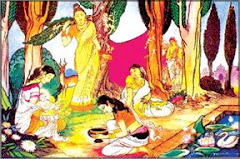
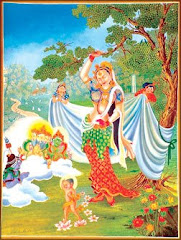
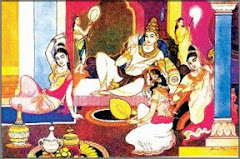

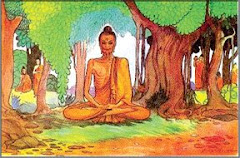



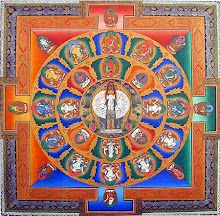
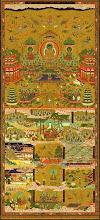
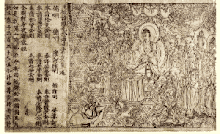
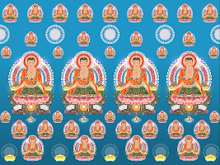

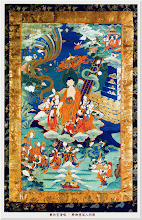

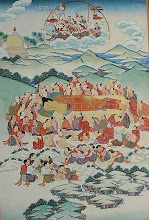


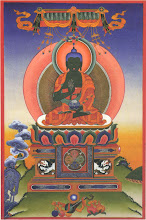




.jpg)

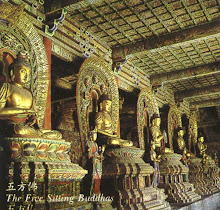

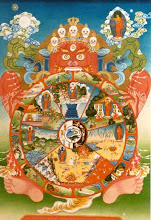


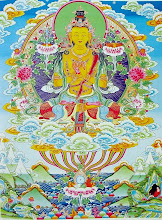








No comments:
Post a Comment